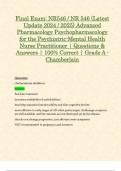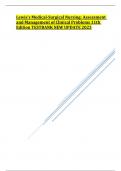Final Exam: NR546 / NR 546 (Latest
Update ) Advanced
Pharmacology Psychopharmacology
for the Psychiatric-Mental Health
Nurse Practitioner | Questions &
Answers | 100% Correct | Grade A -
Chamberlain
Question:
cholinesterase inhibitors
Answer:
first line treatment
increases availability of acetylcholine!
may help maintain function ability and slow cognitive decline
most effective in early stages of AD when postsynaptic cholinergic receptors
are still available, and the neurons are not destroyed yet by the disease
they do not change progression, just alleviate some symptoms
NOT recommended in pregnancy and lactation.
,Question:
donepezil
Answer:
mild, moderate, severe AD
also treats psychological symptoms of AD such as anxiety, depression, apathy,
delusions, and pacing
MOA: inhibits centrally active acetylcholinesterase
Dose: 5 mg/day
adverse effects: GI s/s, headache, dizziness, muscle weakness
cautions: sick sinus syndrome, seizure disorder, increases gastric acid
secretion, bradycardia
taper to avoid withdrawals!
*donepezil at a higher dose has a higher incidence of adverse effects without
increased cognitive benefit
Question:
rivastigmine
Answer:
mild-moderate AD & Parkinson’s disease dementia
MOA: inhibits both centrally active acetylcholinesterase and
butyrylcholinesterase, increasing its efficacy
dose: 1.5 mg twice daily OR transdermal patch 4.6 mg/24 hours
the transdermal patch is for dementia associated w parkinsons
adverse effects: GI s/s, weakness, dizziness, tremor
,cautions: asthma or COPD, sick sinus syndrome, GI bleeding, severe vomiting
with esophageal rupture
*Medications that induce or inhibit CYP450 metabolism will not modify
rivastigmine metabolism
Question:
galantamine
Answer:
mild-moderate AD
MOA: inhibits centrally active AChE, making more available. modulates
nicotinic receptors, enhance the actions of other NT by increasing the release
of dopamine, norepinephrine, serotonin, GABA, glutamate
dose: 5 mg twice a day OR ER in the morning
contraindications: severe hepatic or renal impairment!
Question:
NMDA receptor antagonist
Answer:
Memantine (Namenda)
only NMDA receptor antagonist approved to manage moderate to severe AD
MOA: prevents glutamate, excitatory NT, from binding at receptor site.
NMDA receptors control activity throughout the brain by regulating how
much calcium enters the nerve cell and disruption info processing
, *gold standard of treatment for cognitive symptoms is a cholinesterase
inhibitor (ChEIs) and NMDA receptor antagonist
Question:
memantine side effects
Answer:
common side effects:
gastrointestinal symptoms (constipation, diarrhea, and weight gain)
urinary frequency
confusion
dizziness
headache
cough
Question:
memantine precautions
Answer:
Precautions
concurrent use with (amantadine, rimantadine, ketamine, or
dextromethorphan)
severe hepatic impairment
severe renal impairment
medications or conditions that increase the pH of the urine





